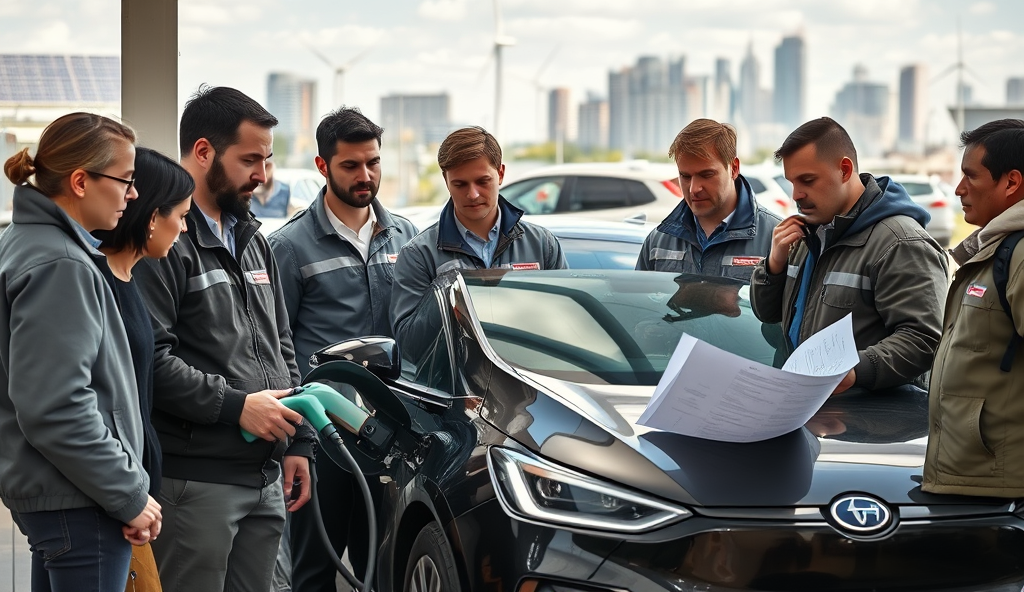Introduction to Electric Vehicle Adoption in Nigeria
Nigeria’s transition to electric vehicles presents both challenges and opportunities as the country seeks to diversify its energy-dependent economy. With rising fuel costs and environmental concerns, EV adoption could address pressing issues while creating new industries, though current infrastructure gaps remain significant barriers.
The Nigerian EV market remains nascent, with only about 200 registered electric vehicles as of 2023, primarily in Lagos and Abuja. Limited charging infrastructure and high upfront costs hinder widespread adoption despite growing interest from urban consumers and fleet operators.
Government policies will play a pivotal role in accelerating EV uptake, as seen in early pilot projects like the Lagos State electric bus initiative. The next section will examine Nigeria’s current EV adoption landscape in greater detail, including policy frameworks and market readiness.
Key Statistics

Current State of Electric Vehicle Adoption in Nigeria
Nigeria's transition to electric vehicles presents both challenges and opportunities as the country seeks to diversify its energy-dependent economy.
Nigeria’s EV adoption remains concentrated in urban centers, with Lagos accounting for 65% of registered electric vehicles due to higher income levels and pilot projects like the Lagos electric bus fleet. However, range anxiety persists as charging stations are scarce outside major cities, with only 15 public charging points nationwide as of 2023.
The average cost of imported EVs exceeds ₦25 million, making them inaccessible to most Nigerians despite potential long-term savings on fuel and maintenance. Local assembly initiatives by companies like Jet Systems aim to reduce prices, but high import tariffs on EV components remain a barrier to affordability.
Consumer awareness campaigns by startups like MAX and renewable energy partnerships show promise in addressing misconceptions about EV reliability in Nigeria’s climate. These grassroots efforts complement pending government policies that could significantly accelerate market growth, which we’ll examine next.
Government Policies Supporting Electric Vehicle Adoption
The average cost of imported EVs exceeds ₦25 million making them inaccessible to most Nigerians despite potential long-term savings on fuel and maintenance.
Building on grassroots efforts to boost EV awareness, Nigeria’s federal government has introduced draft policies to formalize electric vehicle adoption, including the National Automotive Industry Development Plan which proposes tax waivers for locally assembled EVs. The Lagos State government has taken the lead with its 2020 Electric Vehicle Policy, targeting 30% EV penetration by 2030 through infrastructure partnerships and pilot programs like the electric bus fleet mentioned earlier.
However, implementation gaps persist as the federal EV policy remains in draft stage since 2021, creating uncertainty for investors despite growing private sector initiatives. The proposed legislation includes charging infrastructure mandates for new buildings and reduced import duties for EV components, which could address the affordability barriers highlighted in previous sections if fully enacted.
These policy frameworks set the stage for more concrete incentives, which we’ll explore next, including proposed purchase subsidies and manufacturing support that could accelerate Nigeria’s EV market growth beyond urban centers. The success of these measures will depend on harmonizing federal and state policies while addressing the charging infrastructure deficit currently concentrated in Lagos.
Incentives for Electric Vehicle Manufacturers and Buyers
Nigeria's federal government has introduced draft policies to formalize electric vehicle adoption including the National Automotive Industry Development Plan which proposes tax waivers for locally assembled EVs.
Complementing the draft policies discussed earlier, Nigeria’s proposed incentives include a 10-year tax holiday for local EV manufacturers and 30% import duty reduction on EV components, aiming to lower production costs by up to 15% according to National Automotive Design and Development Council estimates. Lagos State offers additional perks like waived registration fees for electric vehicles, mirroring its 2030 penetration targets.
For buyers, the federal plan proposes 5% VAT exemption on EV purchases and potential subsidy programs modeled after Ghana’s successful 20% rebate scheme, though implementation timelines remain unclear. Private sector players like Jet Motors already offer installment payment plans for their electric buses, addressing affordability concerns raised in previous sections.
These incentives could significantly boost EV market growth in Nigeria if properly implemented, though persistent challenges like charging infrastructure gaps—to be discussed next—may limit their effectiveness beyond major cities. Harmonizing these measures with existing state-level policies will be crucial for nationwide impact.
Challenges Facing Electric Vehicle Adoption in Nigeria
Nigeria's EV adoption faces infrastructure hurdles with fewer than 50 public charging stations concentrated in Lagos and Abuja creating range anxiety for potential buyers outside urban centers.
Despite promising incentives, Nigeria’s EV adoption faces infrastructure hurdles with fewer than 50 public charging stations concentrated in Lagos and Abuja, creating range anxiety for potential buyers outside urban centers. Unstable power supply compounds this challenge, as 40% of Nigerians lack reliable electricity access according to World Bank data, undermining home-charging feasibility even with the proposed VAT exemptions.
High upfront costs remain prohibitive despite installment plans, with locally assembled EVs like Jet Motors’ buses costing 30% more than combustion equivalents due to imported battery components. Limited public awareness further slows adoption, as only 22% of Nigerians demonstrate familiarity with EV technology based on a 2023 Clean Energy Initiative survey.
These barriers threaten to dilute the impact of federal and state incentives discussed earlier unless addressed through coordinated infrastructure investments and consumer education programs, which present untapped opportunities for growth explored in the next section.
Opportunities for Growth in the Electric Vehicle Sector
Norway's comprehensive EV policy framework combining tax exemptions toll-free roads and charging infrastructure investments boosted EV adoption to 80% of new car sales by 2022—a model Nigeria could adapt.
Nigeria’s EV sector presents untapped potential, particularly in decentralized solar-powered charging solutions, which could address the unreliable grid and expand access beyond Lagos and Abuja. Startups like MAX.NG are piloting solar-hybrid charging stations, offering a scalable model for rural areas where 60% of the population lacks consistent electricity.
Local battery manufacturing could reduce the 30% cost premium on EVs by cutting import dependence, as seen in Innoson Vehicle Manufacturing’s plans to produce lithium-ion batteries domestically by 2025. Partnerships with renewable energy providers could further lower operational costs, aligning with Nigeria’s Energy Transition Plan to achieve net-zero emissions by 2060.
Targeted consumer education campaigns, leveraging mobile platforms like USSD codes, could bridge the awareness gap, especially among the 78% unfamiliar with EV technology. These initiatives, combined with infrastructure investments, set the stage for policymakers to amplify impact, as explored in the next section.
Role of Government Policymakers in Promoting Electric Vehicles
Building on Nigeria’s emerging EV infrastructure and local manufacturing potential, policymakers must prioritize fiscal incentives like import duty waivers for EV components, mirroring Kenya’s 10% excise tax exemption. Such measures could accelerate Innoson’s battery production plans while addressing the 30% cost barrier highlighted earlier.
Strategic partnerships with renewable energy providers, as proposed in Nigeria’s Energy Transition Plan, should be formalized through policies mandating solar integration at charging stations, particularly in off-grid areas serving 60% of the population. This aligns with MAX.NG’s solar-hybrid pilot and reinforces grid independence.
To scale consumer education, policymakers could mandate USSD-based EV literacy programs through telecom partnerships, targeting the 78% awareness gap. These interventions set the stage for examining global policy models, as explored next in successful international case studies.
Case Studies of Successful Electric Vehicle Policies in Other Countries
Norway’s comprehensive EV policy framework, combining tax exemptions, toll-free roads, and charging infrastructure investments, boosted EV adoption to 80% of new car sales by 2022—a model Nigeria could adapt by scaling its proposed import duty waivers. Similarly, China’s mandate for 20% of all government fleets to be electric by 2025 demonstrates how public sector procurement can stimulate local manufacturing, relevant to Innoson’s ambitions.
India’s FAME II scheme subsidizes EVs while requiring localized production, reducing costs by 40%—a strategy Nigeria could replicate to address its 30% cost barrier through partnerships with renewable energy providers. The UK’s requirement for all new homes to include EV charging points offers a template for Nigeria’s off-grid solar integration, particularly for the 60% underserved population.
California’s Zero-Emission Vehicle mandate, requiring automakers to produce EVs, has driven innovation while Kenya’s 10% excise tax exemption mirrors Nigeria’s proposed fiscal incentives. These global examples provide actionable insights for Nigeria’s upcoming policy recommendations, bridging the 78% awareness gap through targeted programs.
Recommendations for Effective Electric Vehicle Policies in Nigeria
Building on global best practices, Nigeria should implement phased import duty waivers for EVs while mandating localized production targets, mirroring India’s FAME II scheme to reduce the 30% cost barrier through partnerships with renewable energy providers. The government could prioritize public sector procurement, requiring 20% of federal fleets to transition to EVs by 2030, leveraging Innoson’s manufacturing capacity to stimulate local EV production.
To address the 78% awareness gap, targeted campaigns should educate consumers on long-term savings from EV ownership, coupled with incentives like toll-free roads and dedicated charging lanes, as seen in Norway’s successful adoption model. Integrating off-grid solar charging stations into new housing developments, inspired by the UK’s approach, would serve Nigeria’s 60% underserved population while aligning with renewable energy goals.
Finally, a Zero-Emission Vehicle mandate for automakers, similar to California’s policy, could accelerate innovation while Kenya’s excise tax exemption model should guide Nigeria’s fiscal incentives to balance affordability and industry growth. These measures would create a cohesive framework, bridging policy gaps and positioning Nigeria as a regional leader in sustainable mobility.
Conclusion on Electric Vehicle Adoption in Nigeria
Nigeria’s EV adoption journey requires coordinated efforts between policymakers, private investors, and energy providers to address infrastructure gaps and affordability concerns highlighted in previous sections. With only 12 public charging stations nationwide as of 2023, strategic partnerships like the Lagos State renewable energy pilot could serve as scalable models for EV charging infrastructure in Nigeria.
The government’s current policies on electric vehicles show promise but need stronger enforcement mechanisms and targeted incentives for local manufacturers to boost domestic EV production. As shown by the stalled National Automotive Industry Development Plan, policy consistency remains crucial for attracting the $2.3 billion investment needed for Nigeria’s EV market growth by 2030.
Looking ahead, Nigeria must balance EV adoption with its oil-dependent economy through phased implementation and public awareness campaigns addressing misconceptions about vehicle range and maintenance costs. The upcoming section will explore how neighboring West African markets are approaching similar transitions, offering valuable comparative insights for Nigerian policymakers.
Frequently Asked Questions
How can Nigeria balance EV adoption with its oil-dependent economy?
Implement phased policies like Norway's model, starting with urban pilot projects while gradually introducing tax incentives for local EV manufacturing. Practical tip: Use oil revenue to fund renewable energy infrastructure for EV charging.
What immediate steps can policymakers take to address Nigeria's charging infrastructure gap?
Mandate solar-powered charging stations in new buildings and partner with telecom companies to deploy USSD payment systems for charging. Tool recommendation: Adapt MAX.NG's solar-hybrid charging model for rural areas.
How can Nigeria make EVs more affordable without straining government budgets?
Offer tiered import duty waivers for locally assembled EVs and create public-private financing schemes like Ghana's 20% rebate program. Practical tip: Start with fleet operators to achieve economies of scale.
What policy measures would most effectively boost consumer confidence in EVs?
Implement toll-free roads for EVs and launch mobile-based education campaigns highlighting long-term cost savings. Tool recommendation: Develop a national EV calculator app showing fuel vs electricity costs.
How can Nigeria ensure its EV policies are effectively implemented across states?
Create a federal-state taskforce to harmonize regulations and tie infrastructure funding to policy compliance. Practical tip: Use Lagos State's 2030 penetration targets as a benchmark for other states.


